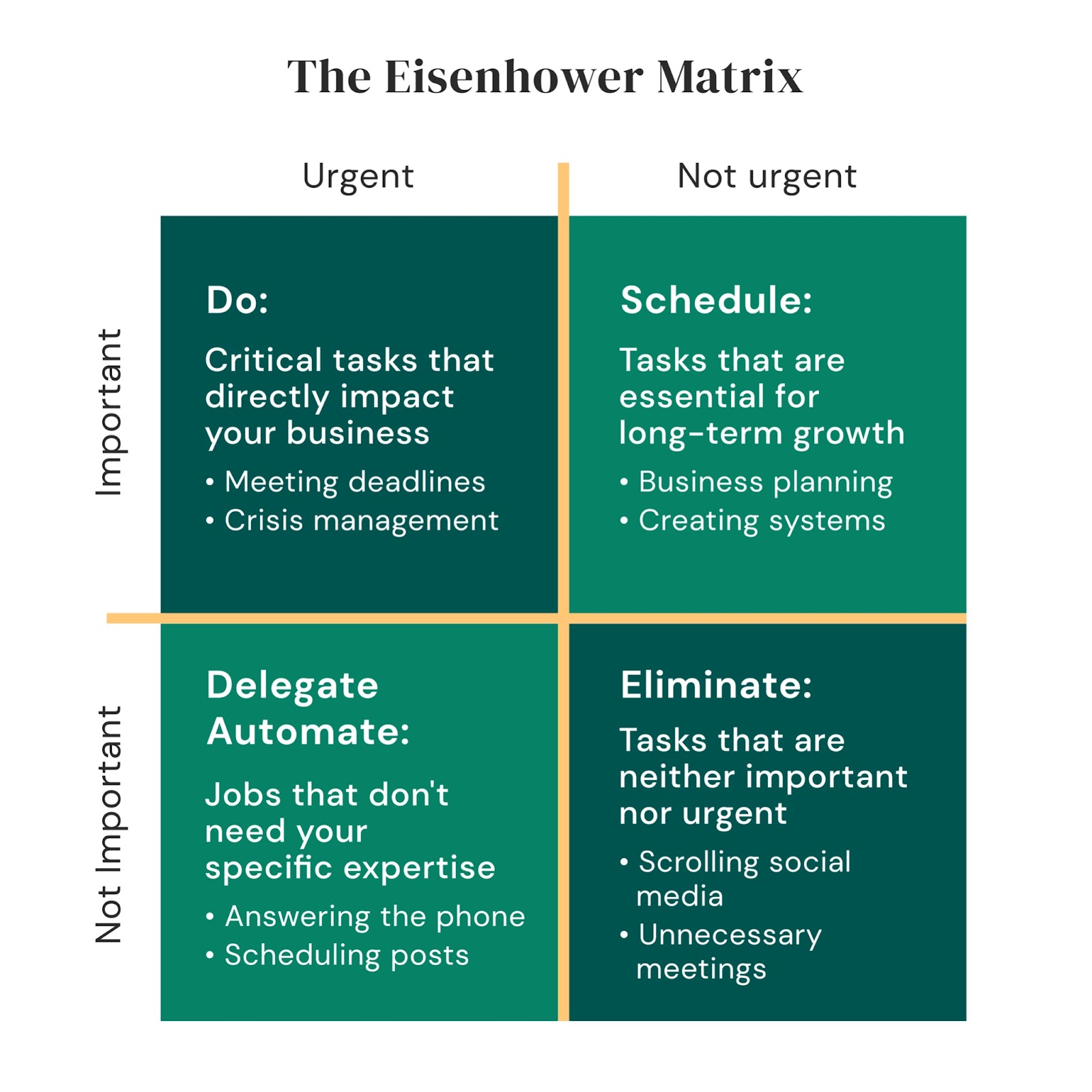In this article, you’ll learn about the benefits of proper schedule management and how to make delegating calendar management for executives easier.
Let’s get right to it:
Why you’re better off delegating calendar management to an executive assistant
CEOs work an average of 62.5 hours a week, based on a study conducted by Harvard Business Review.
All that work is bound to put a strain on one’s physical and mental health, so it’s no surprise why business owners are delegating more tasks to their executive assistants, including calendar management.
What is calendar management?

It’s the process of organizing your to-dos in a way that best maximizes your time, both at work and in your personal life. This is usually done through applications like Google Calendar and Outlook. More than anything, though, it requires smart time management and a strong grasp of your priorities.
There are several reasons to hand this task over to your executive assistant, such as:
- Improved organization - A well-organized calendar leaves less margin for error. You can avoid double bookings and stay on track with deadlines.
- Increased efficiency - Your executive assistant can take care of last-minute rescheduling and respond right away to meeting invites. This makes a good impression on your clients and employees.
- More time in your hands - You’ll have a lot more room on your schedule with a schedule management pro handling your calendar. You can use the extra hours to plan your next product launch, hit the gym, or spend quality time with friends and family.
What roadblocks are keeping you from delegating calendar management?

Offloading calendar management can do business owners a world of good. But as with anything involving your company, it’s normal to have reservations like:
Privacy breaches
Whether it’s protecting clients’ sensitive information or keeping your personal life private, we know it’s a big deal to entrust your calendar to a person halfway across the world. But there are ways to share your calendar with your remote executive assistant while safeguarding your data, such as:
- Letting your assistant sign a non-disclosure agreement
- Choosing the right calendar platform: one that offers audit logs, encryption, and authorization
- Limiting permissions
- Removing access after they’re out of the company
Related: Best Practices for Sharing Confidential Info with Your Assistants
No time for training
While teaching your assistant about your schedule and preferences may seem like a chore, it’ll be worth it in the long run.
Let’s say you dedicate a few hours of your schedule to writing down your SOP or recording a walkthrough on Loom. By documenting each step, your assistant will have an easier time learning. Plus, you’ll have training materials to use in the future.
Learn more about making SOPs through The Delegation Leap Course. It’s free!
Not having a reliable executive assistant
Maybe the problem is that you haven’t found a trustworthy assistant in the first place. If you’ve been sifting through dozens of applications with no leads, using a headhunter agency like Somewhere may be just the solution. With our help, you can hire an amazing Filipino assistant at 80% less than local counterparts.
5 tips for delegating calendar management to executive assistants

Now that you’re convinced it’s smart to hand over the schedule management reins to your assistant, let’s discuss how to do it:
1. Don’t limit your schedule management tool to just meetings
If you only use your calendar to schedule meetings, you’re not using it to its full potential. You aren’t getting the full picture of what’s in store each week, and you run the risk of forgetting an important event.
Here’s a list of items you can have your assistant plot in your executive calendar:
- Deadlines
- Personal appointments
- Strategic planning
- Events like graduations, birthdays, and employee anniversaries
- Out-of-office days
PRO TIP
Have events color-coded for more convenience. Purple, for example, can be assigned for internal events while orange can represent external events. You can also color-code based on priority level.
You can also cross-reference your calendar with any project management tools you use, to make sure all project timelines are met and that you are staying on top of both your personal time and still moving your business forward.
2. Be clear about your preferences
Don’t want to meet a client before having your first cup of coffee for the day? Then share your preferences in a file. It’s best to have them documented so your assistant won’t miss anything.
Here are some things to include in your personal preferences doc:
- Your preferred time for meetings and deep work
- How long you want meetings to last
- What platform to use for online meetings (ex. Slack for quick calls; Zoom for company-wide meetings)
- The maximum amount of meetings you can handle in a day
- Any recurring meetings that need to be scheduled on a regular basis
That way, when meeting requests come in, both you and your executive assistant will be on the same page and no scheduling conflicts will arise.
IMPORTANT
Don’t forget to take out-of-town trips into consideration, especially if you’re a frequent traveler. You may want to hold off on meetings unless they’re absolutely essential.
3. Create a priority list
The next step is to weigh all your to-dos according to importance. With your assistant, identify what should go first on your agenda, what can be put off till the end of the week, and what someone else can do instead.
The Eisenhower Matrix can help you with this. Named after President Dwight Eisenhower, it’s a tool that simplifies how you gauge priorities. It’s divided into four quadrants:

- Important and urgent: These are things only you can do, and in most cases, require a lot of your energy for the week. Think closing that deal with a new client, chairing a shareholder meeting, and interviewing a potential virtual assistant.
- Important but not urgent: The tasks under this quadrant are also necessary, but they’re flexible. Taking 1:1s with your newest hire or creating a knowledge base for your team, for example. You can schedule these at the middle or end of the week.
- Urgent but not important: Have something that needs prioritizing, like slides for your big presentation or fixing the wrong link on your FB post? If your assistant can handle it, then delegate it to them. But if it does require your attention, just work on it toward the end of your work day.
- Not important and not urgent: These are the activities you can skip entirely. Have multiple meetings in a day? Get rid of the unnecessary ones. If something can be relayed through email, then there’s no need to hop on a call.
4. Spell out roles
Will your assistant accept calendar invites on your behalf or will you do it yourself? When will they need your go-ahead? Are they also handling email management tasks? Are they scheduling appointments? Tackling any administrative tasks? You need to specify the extent of their role. If this isn’t plainly defined, you might wonder why there are random meetings you “agreed” to attend.
5. Leave room for flexibility
Sometimes, you’ll be faced with surprises. These can be suddenly rescheduled meetings or an urgent problem, like a glitch that charges customers double.
You won’t experience these every day, but to be safe, allocate time for them. Maybe one hour three times a week. The exact hours and frequency will depend on your kind of business. By factoring in unexpected tasks, you can avoid the headache of reshuffling your whole schedule.
This also ensures you have enough room for any unexpected personal tasks.
Work smarter with executive calendar management
Calendar management and delegating tasks is an art and a science, and with your busy schedule, you just can’t perfect it by yourself. Nor can you expect your executive assistant to read your mind, no matter how good their calendar management skills are.
You’ll need to work together to develop a system that’s organized and in tune with your priorities. Once you do, say hello to better productivity.
Need help finding the right executive assistant? That’s what Somewhere is here for! Get in touch with us now to discuss what you want in your dream candidate.








.jpeg)





